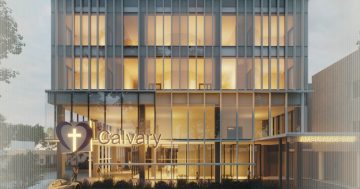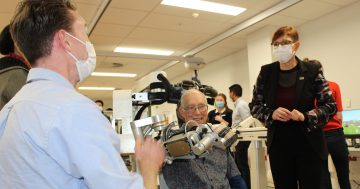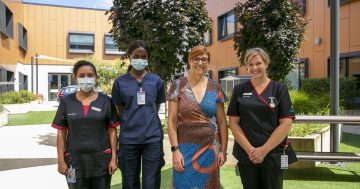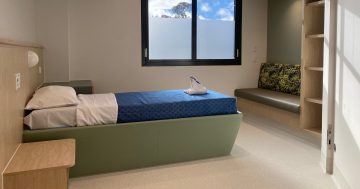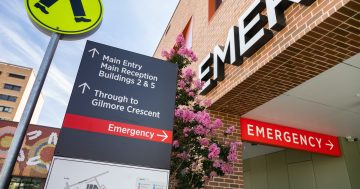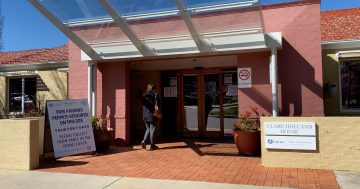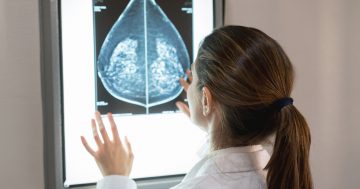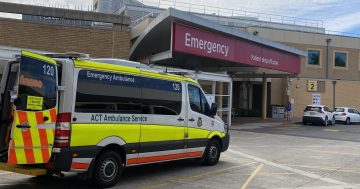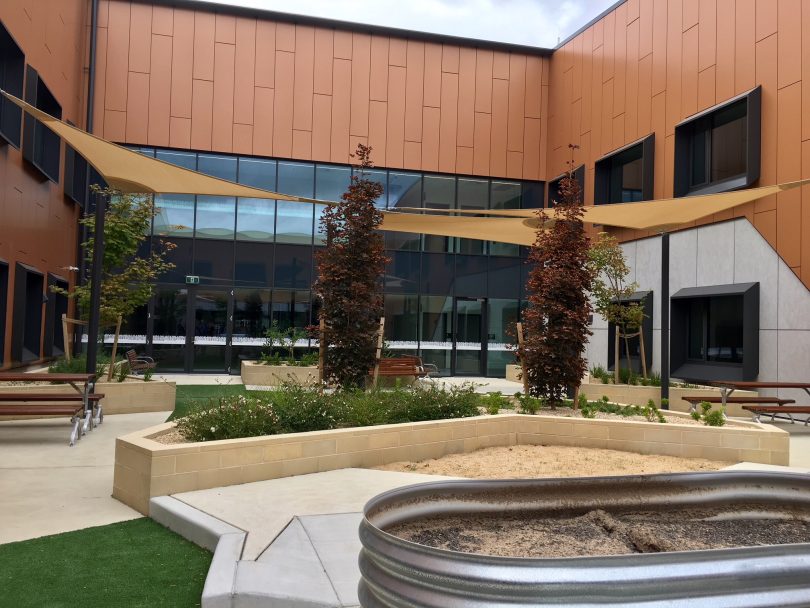
The new University of Canberra Hospital building. It is expected to open in the middle of the year. Photos: Supplied.
Canberra’s newest public hospital – a specialist rehabilitation, recovery and research facility at the University of Canberra – is expected to open in mid-2018 after the completed building was officially handed over to ACT Health yesterday (19 February).
The ACT Government said the handover was a major milestone for better healthcare in the ACT and marked the culmination of almost seven years of planning and work to deliver Canberra’s third public hospital.
Officially known as the University of Canberra Hospital: Specialist Centre for Rehabilitation, Recovery & Research, it will also carry an Indigenous name, with the Government working with the United Ngunnawal Elders Council to select an appropriate Ngunnawal word.
The new hospital will offer physical and mental health services by referral, including tailored inpatient and outpatient programs.
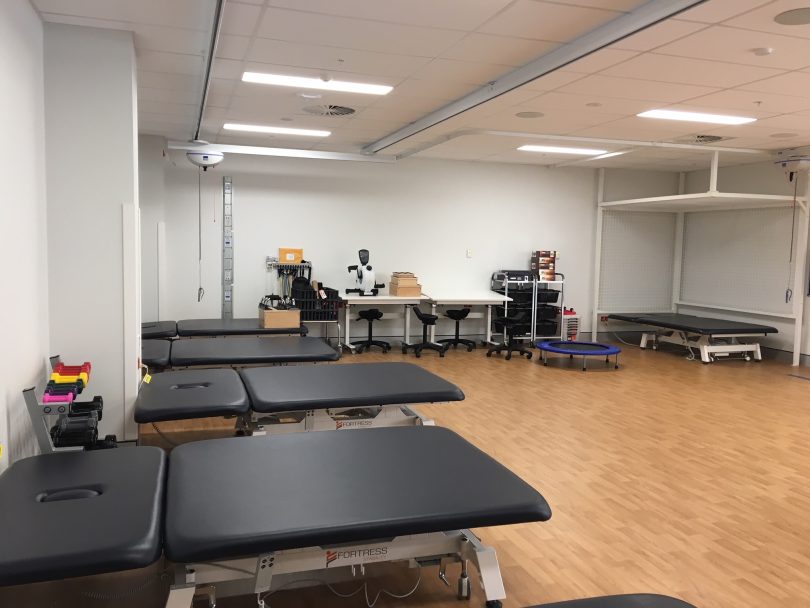
The University of Canberra Hospital will be a specialist rehabilitation, recovery and research centre.
Over the coming months, hundreds of dedicated staff from ACT Health and Calvary Public Hospital Bruce will be relocated to the University of Canberra Hospital, along with new staff currently being recruited. The estimated 300 staff will be trained and familiarised with the layout of the new building.
As well, equipment and furniture will be installed throughout the building and a cafe built in the heart of the centre.
Minister for Health and Wellbeing Meegan Fitzharris said today’s milestone meant Canberra was another step closer to having a dedicated hospital to help people recover from surgery or injury, or experiencing mental illness.
“This new public hospital has been designed and purpose-built to support quality healthcare through state-of-the-art technologies and innovative therapy spaces,” she said.
“It includes specially designed features to support recovery, including a hydrotherapy pool, rehabilitation courtyards, gymnasiums and kitchens. At full capacity, it will have 140 overnight inpatient beds, 75-day places and additional outpatient services.
“I would like to thank ACT Health and Calvary Public Hospital Bruce staff in advance for their commitment to healthcare as they move into this new centre, and I acknowledge lead contractor Multiplex, who have delivered a high-quality building for the people of Canberra.”
The hospital does not include an Emergency Department or Intensive Care Unit and the Government says residents in Canberra’s north should continue using Calvary Public Hospital for emergencies.
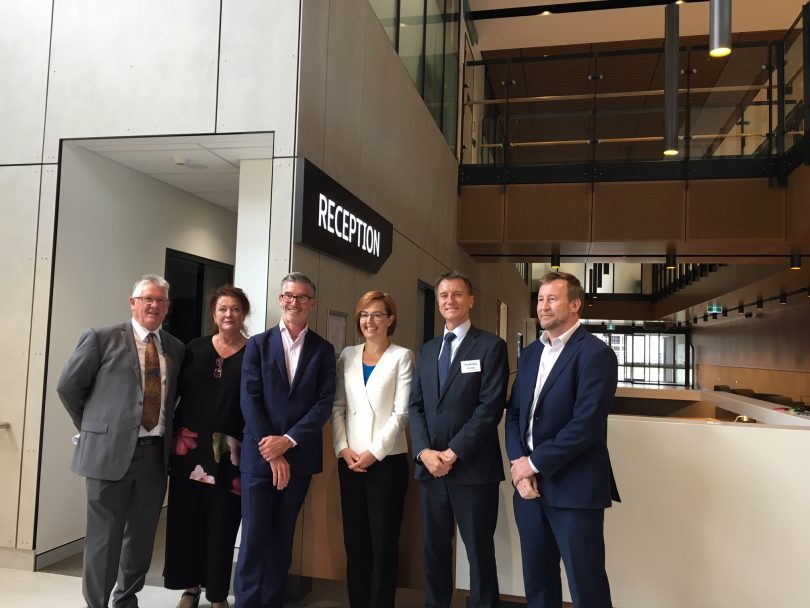
Health Minister Meegan Fitzharris (white coat) with representatives from ACT Health, University of Canberra and Multiplex.
Today’s milestone coincides with the Government announcing a health workforce recruitment campaign that will emphasise the liveability of Canberra and the growing opportunities across the health sector.
The Government has announced an expansion of health services to meeting increased demand and the needs of Canberra’s growing population.
It said that demand at the Canberra Hospital had grown by 9.5 per cent over 12 months from 2015-16 to 2016-17 and population was growing by more than 6,000 people each year.
New health spending includes the University of Canberra Hospital, new Walk-in Centres in Gungahlin, Weston Creek and the Inner North, the expansion of the Centenary Hospital for Women and Children, planning for a new Northside Hospital, investment in the future SPIRE Centre at the Canberra Hospital and a new purpose-built facility for Aboriginal and Torres Strait Islanders.
“The ACT Government is always looking to attract new people who are highly skilled to our city, and the health sector is one area we know there are opportunities right now, and into the future,” the Minister said.
She said the Territory-wide Health Services Framework would guide health service delivery for the next 10 years, with a specific focus on ensuring career satisfaction is high within ACT Health.
“There will be a strong focus on management and leadership training opportunities, supporting clinicians to diversify their skills and take on more senior roles, and improving pathways for students to progress into the ACT Health workforce,” Ms Fitzharris said.
“Attracting and retaining health specialists to Canberra will be a priority to not only help resource our expanding public healthcare sector, but also ensure we tackle some of our biggest challenges when it comes to elective surgery. Specialist areas that will be a focus include ear nose and throat specialists and anaesthetists, as well as psychiatrists,” she said.
Minister for Mental Health Shane Rattenbury said recruitment in the mental health space was also essential with the Government’s commitment to expanding mental health services.
“In addition to ongoing national and international recruitment efforts concerning psychiatrists, we have run a successful recruitment campaign for the expansion of the Dhulwa Mental Health Unit, and have established a psychology registrar program to improve the ability to recruit psychologists,” he said.












